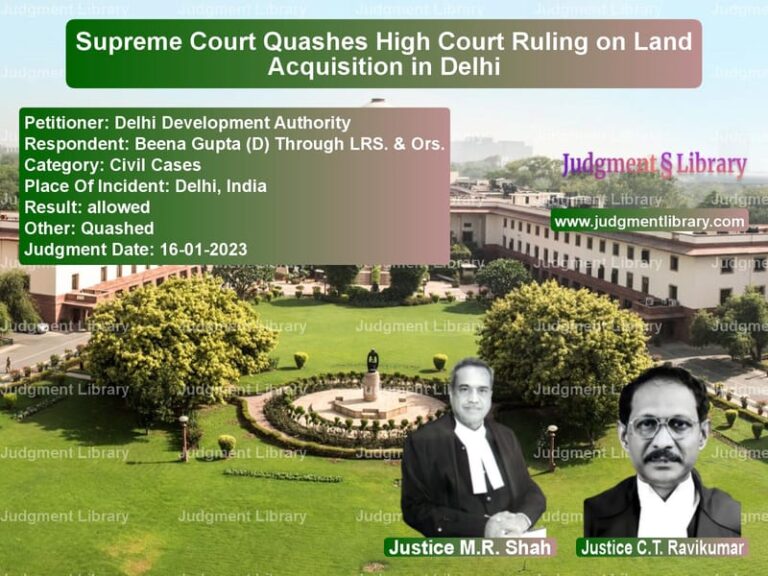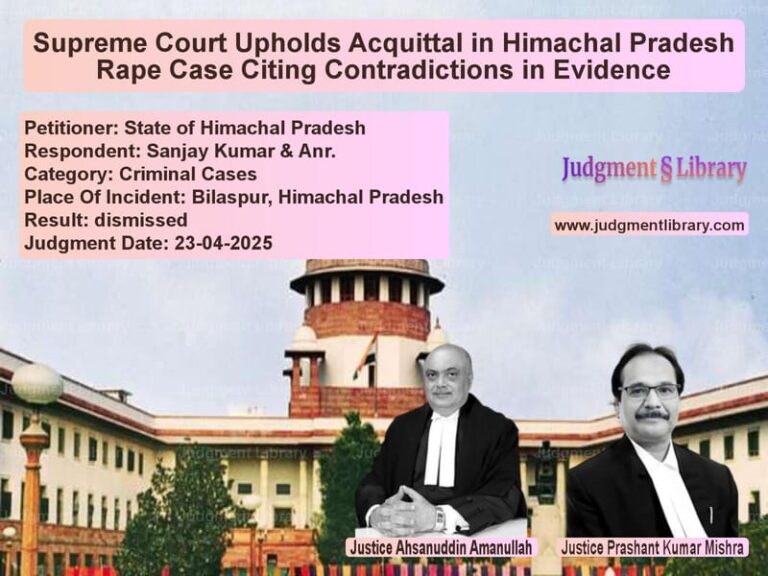Supreme Court Restores Land Ownership Rights in Rajasthan Colonization Case
The case of Legal Representative of Bhagwani Devi, Bharat Bhushan vs. The State of Rajasthan & Others revolves around a long-standing dispute over land ownership in Rajasthan. The Supreme Court of India ruled in favor of the appellant, restoring the order of the learned Single Judge, which had set aside the resumption of land by the State. The ruling reaffirmed that the government could not resume land without following due process.
Background of the Case
The dispute pertained to a piece of land originally allotted to Lal Chand, son of Ghasi Ram. Lal Chand had entered into an agreement to sell the land to Bela Ram on June 5, 1986. Later, the land was transferred within the family through partition, and an application for regularization was submitted by Chandra Bhan, son of Bela Ram. However, the Additional District Collector, Sri Ganganagar, rejected the application on April 24, 1995. Subsequent appeals before the Revenue Appellate Authority and the Board of Revenue were also dismissed.
Meanwhile, the appellant had purchased the property on July 4, 1991. A writ petition was filed challenging the rejection orders. The learned Single Judge ruled in favor of the appellant, citing that the land resumption was done without affording a hearing to the appellant.
The Rajasthan government appealed against the Single Judge’s order before the Division Bench of the High Court, which overturned the decision. The Division Bench held that restrictions on land transfers under the Rajasthan Colonization Act, 1954, were still in operation and reinstated the State’s right to resume the land. The appellant then approached the Supreme Court.
Legal Issues Before the Court
- Whether the Rajasthan government could resume land without affording an opportunity of hearing to the landowner.
- Whether the notification dated November 30, 1971, restricting land transfers, was still applicable after subsequent amendments.
- Whether the Division Bench of the High Court erred in overturning the order of the Single Judge.
Arguments by the Petitioner (Appellant)
The appellant’s counsel contended:
- “The government resumed land without providing a hearing to the appellant, violating principles of natural justice.”
- “The restriction on transfers imposed by the 1971 notification was lifted by a subsequent 1985 notification, making the sale in favor of the appellant valid.”
- “The Division Bench ignored the fact that the government’s own advocate conceded before the Single Judge that the land could not be resumed without following due process.”
Arguments by the Respondent (State of Rajasthan)
The State of Rajasthan defended its position, arguing:
- “The transfer of land was restricted under the Rajasthan Colonization Act, 1954, and the 1991 notification reimposed these restrictions.”
- “The Division Bench correctly held that the Single Judge’s ruling was contrary to the statutory framework.”
- “The appellant purchased the land in violation of the land transfer rules and cannot claim ownership rights.”
Supreme Court’s Analysis and Judgment
The Supreme Court examined the notifications governing the transfer and resumption of land. It observed:
- “The 1985 notification repealed the 1971 notification, thereby removing restrictions on land transfers.”
- “The 1991 notification, relied upon by the Division Bench, applied only to land situated within the Indira Gandhi Canal and Gangnahar Projects. The land in question did not fall within this area.”
- “Since the government’s advocate had conceded before the Single Judge that resumption was improper, the Division Bench erred in interfering with the order.”
The Court ruled:
“The appeal is allowed. The impugned judgment and order of the Division Bench is quashed and set aside. The order of the learned Single Judge is restored.”
Key Takeaways from the Judgment
- Government authorities must follow due process before resuming land.
- Restrictions on land transfers must be interpreted based on the latest applicable notifications.
- Decisions of Division Benches should not override factual concessions made by government advocates before lower courts.
- Natural justice principles require that landowners be heard before the government takes adverse action against their property.
Impact of the Judgment
This ruling is a significant victory for landowners in Rajasthan, reaffirming that the government cannot resume land arbitrarily. The decision highlights the importance of following proper legal procedures and respecting prior concessions made in court. The Supreme Court’s ruling ensures that land transfers made during periods when restrictions were lifted remain legally valid.
Petitioner Name: Legal Representative of Bhagwani Devi, Bharat Bhushan.Respondent Name: The State of Rajasthan & Others.Judgment By: Justice B.R. Gavai, Justice Aravind Kumar.Place Of Incident: Sri Ganganagar, Rajasthan.Judgment Date: 11-04-2023.
Don’t miss out on the full details! Download the complete judgment in PDF format below and gain valuable insights instantly!
Download Judgment: legal-representative-vs-the-state-of-rajasth-supreme-court-of-india-judgment-dated-11-04-2023.pdf
Directly Download Judgment: Directly download this Judgment
See all petitions in Property Disputes
See all petitions in Landlord-Tenant Disputes
See all petitions in Damages and Compensation
See all petitions in Contract Disputes
See all petitions in Specific Performance
See all petitions in Judgment by B R Gavai
See all petitions in Judgment by Aravind Kumar
See all petitions in allowed
See all petitions in Quashed
See all petitions in supreme court of India judgments April 2023
See all petitions in 2023 judgments
See all posts in Civil Cases Category
See all allowed petitions in Civil Cases Category
See all Dismissed petitions in Civil Cases Category
See all partially allowed petitions in Civil Cases Category







